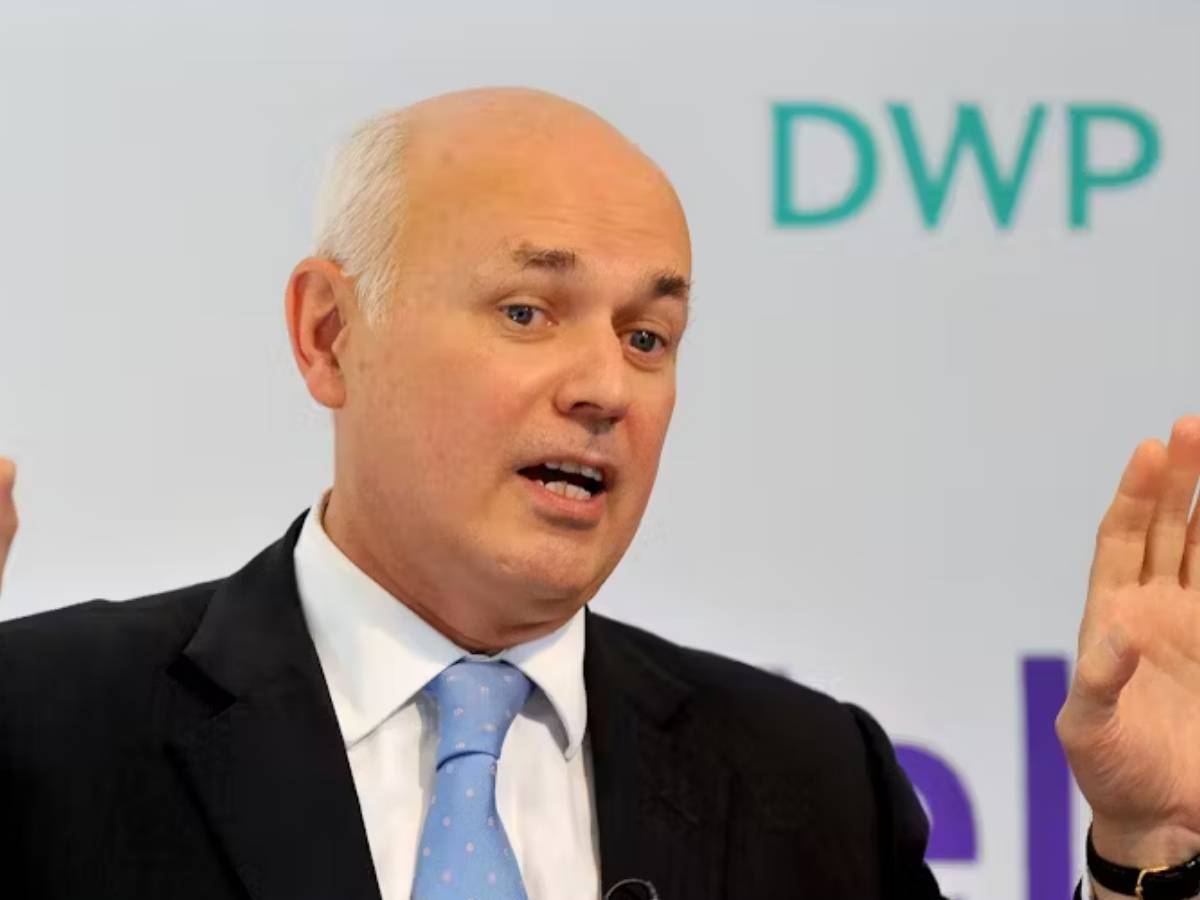This is part one of a three-article investigation into the CSJ’s influence over the previous Conservative government, and Labour’s welfare policies while in opposition. In particular, it explores how the CSJ shaped the narrative over coercing chronically ill and disabled people into work.
Part one will unpack the think tank’s role in pushing a particular work programme model. Part two will explore a UK scheme the CSJ has promoted as a basis for this. The final part will look at a new scheme the Tories launched over the past year inspired by that programme.
Iain Duncan Smith’s think tank the Centre for Social Justice (CSJ) is peddling a model for Department for Work and Pensions (DWP) devolution of employment support. However, it looks to be little more than a progressive-sounding red herring. In reality, it seems like simply another repackaged work programme to coerce chronically ill, disabled, and other marginalised groups into work.
Of course, it’s precisely why the supposed centre right CSJ has been playing the field with the Tories and the Labour Party to promote this. In fact, one Tory-introduced pilot programme exposes the extent of the CSJ’s influence on the previous government’s back-to-work reforms.
Now that Labour has come to power, and just weeks ahead of the party’s conference, the think tank has thrown its lobbying machinery into gear. Specifically, it has drawn up a new report demanding Labour expand the Tories’ work on this.
CSJ is lobbying Labour with new DWP reports
On 3 September, the CSJ hosted a live event for the launch of two new reports. As the Canary previously noted, it coincided publishing these with the end of the summer parliamentary recess. The main report offers 50 recommendations for the new Labour government. These cover policy ideas in multiple areas across work, housing, crime, education, and family. Predictably, it put tackling so-called “health related economic inactivity” as one of the priorities under its work umbrella.
By contrast, the other report targeted this directly, and the CSJ titled it:
‘Going Dutch: Devolving employment support and adult education to tackle economic inactivity’
It explores three examples of this supposed devolved model implemented in different places. As the name suggests, one is in Holland. Another is based in Denmark. The final of these is in the UK – Greater Manchester’s ‘Working Well’ programme.
The combined authority has run three main iterations of this since 2014. The first was a two-year pilot. Then, Greater Manchester followed this up with the expansion programme, running until December 2019. The latest of these, known as the ‘Working Well: Work and Health’ programme, is still operating until 2026.
Greater Manchester have also hosted a number of additional spin-off versions of the programme targeting particular vulnerable groups.
Crucially, the CSJ report boasted the scheme as a “roadmap” for greater devolution of the DWP’s so-called employment support. However, it isn’t the first time the CSJ has promoted Working Well. And significantly, its lobbying efforts have already led to the Tories introducing a new scheme with “its roots” in this.
The ‘often forgotten sister to Universal Credit’
Notably, it has made brief references to the scheme in previous reports too. It did so in an October 2022 CSJ publication named:
Feeling the Benefit: how Universal Support can help get Britain working
This called for the government to reallocate overspend on its failing Restart Scheme work programme to Universal Support. It has described this as the “often forgotten ‘sister’ to Universal Credit” and explains that it is:
designed to help those facing barriers to the labour market into work and to overcome complex challenges holding them back in their lives.
In principle, Universal Support sounds like a positive thing since it supposedly centres round removing societal barriers for disabled people.
However, this doesn’t actually appear to be what the Universal Support programme the CSJ has highlighted genuinely entailed – but more on this later.
CSJ calling to ‘roll-out a revamped’ work programme
While it didn’t explicitly spell out the Working Well programme in the 2022 report, it did use it as a basis for its cost calculations for the roll out of Universal Support. In particular, this concerned the number of long-term sick “economically inactive” benefit claimants the CSJ has estimated want to work. However, as the Canary previously detailed, its methodology and information basis for producing the figure were significantly flawed. However, that aside, it wrote in the report that:
This estimate is made using spending on the comparable Key Worker scheme in Manchester, Working Well, taking an individual cost-estimate and multiplying by the 700,000 people who would most obviously benefit from Universal Support if rolled out nationally
Then, in an article for Tory news site Conservative Home, CSJ CEO Andy Cook wrote about Working Well, saying that:
This programme is remarkably similar to the original design for Universal Support – the long-forgotten sister to Universal Credit. Now is the time to roll out a revamped Universal Support, using the huge underspend on the poorly targeted Restart scheme.
In other words, it’s evident that Working Well encapsulates the CSJ’s vision for what Universal Support should look like. And crucially, long before its latest reports, it has been calling for more programmes just like Greater Manchester’s purportedly pioneering scheme.
Tories take CSJ ideas forward
The timing of Cook’s article was also telling. He penned this a week before the Tories’ Spring budget in March 2023.
Why was this significant? Because, low and behold the Tories launched a sweep of new programmes just like those the CSJ had been calling for.
A little on the nose, one is quite literally unoriginally-named Universal Support. To date, the details on this are few and far between. Primarily though, it seems to simply be a rebrand, or potential expansion of two existing schemes. The first was the government’s Work and Health programme. This was essentially the DWP’s non-devolved answer to Greater Manchester’s third Working Well programme.
The second was the Individual Placement and Support in Primary Care (IPSPC). As the Canary’s Steve Topple noted on this before:
the scheme isn’t actually being run by the NHS. Local authorities are applying for funding from the DWP. Then, they can use the cash to outsource the running of IPSPC to private companies or charities.
Moreover, he pointed out that this US model of healthcare-based employment support was intended for people living with mental health conditions. Nevertheless, the DWP’s IPSPC programme would expand this out to chronically ill and disabled people. Coincidentally, or perhaps not, Greater Manchester also hosted the pilot for this. What’s more, Topple highlighted how a previous IPS scheme the DWP and NHS had already implemented for people living with mental health issues had been an abject failure.
Enter DWP WorkWell
Alongside these rehashed schemes posing as Universal Support was a pilot scheme supposedly devolving aspects of the DWP to 15 local authority areas. This is called WorkWell, and as its name suggests, Greater Manchester’s Working Well programmes inspired it. That’s according to the CSJ itself by the way – because evidently, it would know.
From all this, it’s clear to see how the CSJ had a hand in shaping the Tories’ welfare agenda. Oddly enough, the think tank hasn’t exactly been shy about this either. In fact, it produced a whole infographic boasting its influence over the Tories’ spring budget announcement.
On a page dedicated to showing off its ‘policy impact’, the CSJ pronounced it had:
recommended a policy of Universal Support to help the hundreds of thousands of people who are not in work but wish to work. Working with the government we helped to design the programme that was announced by Chancellor Jeremy Hunt with a commitment of £1 billion investment.
In short, the CSJ has been lobbying recent Tory administrations to implement this model en masse. And it appears as if the previous Tory government was listening.
Labour listening too
However, the Tories weren’t exactly the only ones taking input from the think tank. Notably, the infographic also detailed that the CSJ had engaged Labour alongside the Tory government to “pursue the issue”. It led to Labour’s then-shadow DWP secretary Jonathan Ashworth giving a speech at the CSJ in January, which the think tank also gloated about in its infographic.
During the keynote, Ashworth mentioned Working Well too, calling the programme “inspirational”. He set out Labour’s plans to expand this approach, purportedly so:
local areas themselves can build the integrated employment and skills support they need to stimulate economic growth, get more inactive adults including the long term sick and over 50s back into the labour force, help more adults into high-skilled, better paid work, and address the labour market needs of businesses and the local economy.
Now, the CSJ’s latest reports have pushed for this again – and as the Canary has already noted, it published these just in time for conference season. Naturally, the CSJ is heading to the Labour Party conference – though currently, it has suspiciously removed its webpage advertising this.
Moreover, we also highlighted Labour DWP minister Stephen Timms was among the people who commissioned the report. Alongside him sat none other than Labour mayor of Greater Manchester Andy Burnham. Burnham virtually Zoomed into the CSJ reports’ launch event. Unsurprisingly, he plugged the combined authority’s flagship scheme – along with the ideas in the CSJ’s report.
CSJ holds sway over both parties’ DWP reforms
Once again then, the lobbying attempts of an infamous DWP think tank show how there’s not really a fag paper between the Tories and the Labour Party when it comes to welfare.
Of course, it should be no surprise that Iain Duncan-Smith vanity-tank and architect of the DWP’s disastrous Universal Credit benefit has continued to hold significant sway over the Tory-led department.
Now, however, it’s clear it sees Starmer’s Labour as a new partner for its ‘workfare’ reforms at the DWP. But then, it’s hardly a surprise.
That’s because, the party’s right has been in step with the vested capitalist-driven interests of this shadowy right-wing think tank all along. After all, it was the Tony Blair Labour government that started the war on sick and disabled people in the first place.
That is, as the Canary’s Steve Topple has previously pointed out, in the late noughties, Labour did the thinking on health-linked welfare reforms to coerce chronically ill and disabled into work.
For all current DWP boss Liz Kendall’s bluster about ending the “blame culture”, it sure looks like Labour will be largely singing from the same hymn sheet – one that the CSJ composed.
Feature image via YouTube – the Centre for Social Justice




